
Women around the world observed the International Women’s Day – March 8 – with marches and strike. Police in countries obstructed the marches and clashed with the marching women. In countries, goons and conservatives attacked women marching in celebration of the day.
With its origins in the labor and socialist movements of the 20th century, the day now recognized by the UN was observed through rallies and events from Caracas, Karachi, London to Baghdad and Sydney to spotlight issues facing women globally.
Reports by media including Reuters, AFP, and AP said:
Marchers in Santiago, Chile, flooded the streets.
Confrontations with police were reported at events in Chile and Turkey and other countries.
In Pakistan and Kyrgyzstan, the rallying women were met with violence.
The COVID-19 or coronavirus outbreak forced cancellations of the day’s programs in some places while others boldly marched, defying fears of the epidemic.

“Justice”, women raise slogan in a concert against femicide in Mexico City Saturday.
A women’s strike in Mexico
The day came on the eve of a planned “women’s strike” in Mexico Monday.
Spurred on by feminist activists, the strike comes in the wake of intensifying protests and demands for government actions against the often grisly murders of women in the country.

Woman painted the names of some of more than 3,000 victims of femicide in Mexico City.
Protests against gender violence in Mexico have intensified in recent years amid an increase in killings of women and girls.
Government estimates say 10 Mexican women are killed daily with more than 3,800 killed last year alone. Many of those cases involve sexual assault.
The strike calling on women to abstain from work and school for a day has gained traction reaching far beyond the Mexico’s activist circles.
Marta Patricia Ramírez, a housewife, organized a neighborhood event to discuss harassment.
Dentist Jesica Solis kept her office closed.
Many large employers also support the strike. Walmart’s 108,000 female workers plan to join the strike. Ford, banking and media company Grupo Salinas, and baked goods producer Bimbo are supporting the movement.
In the days leading up to the strike, women have been out in force with thousands attending events. On Saturday, a concert performed entirely by female artists packed Mexico City’s Zocalo, the metropolis’s main square. Attendees chanted “justice” as a singers performed the anti-femicide anthem, “Song without Fear”.
On Sunday, activists painted more than 3,000 names of victims across that same square.
Coronavirus: events canceled, others march without fears
South Korea and China called off public events on the day due to coronavirus.
China used the day to highlight work of female medical staff fighting the coronavirus outbreak.
Women’s marches went ahead in Indonesia, the Philippines and Thailand, where women demanded increased labor protections and greater rights.
Celebrations, rallies and marches continued across Europe including Italy, the country with the greatest number of infections in the continent, despite partial lockdown of the country.

A women’s march in Paris.
Clashes at marches
But every celebration of the day did not go peacefully.
In several countries, marchers were faced with opposition by both religious hardliners as well as local authorities.
Bishkek, Kyrgyzstan

Kyrgyz police officers detain an activist in Bishkek.
In Bishkek, capital city of Kyrgyzstan, a march opposing violence against women was targeted by a group of masked men, donning traditional Kyrgyz hats. The attackers snatched placards belonging to protesters and beat up some of them. Adding insult to injury, many protesters were detained by police in the aftermath of the scuffle.
Turkey
In Turkey, police blocked hundreds of women in Istanbul from entering the city’s Taksim Square. The roads leading to the city’s famed square were closed because they were “not classified as designated areas for assembly and demonstrations according to law,” says a governor’s statement.
Police fired tear gas at the last few dozen people trying to march for International Women’s Day. The original crowd formed on the edge of Istanbul’s Taksim Square and attempted to march down the main pedestrian thoroughfare Istiklal Street. A row of police officers blocked the entrance to the street, however.
“All roads leading to Taksim Square and Istiklal Street will be closed as these places are not classified as designated areas for assembly and demonstrations according to law,” Istanbul’s governor said in a statement.
Chile

Women were sprayed by a police water cannon in Santiago Sunday.
In Chile, there were several reports of clashes with police and a handful of arrests. In the capital Santiago, reports of crowd size conflicted, with organizers saying 2 million marchers flooded the streets while police said it was only 120,000.
Marchers decried abuses they said Chile’s security services carried out against women during those protests.
Manila

Women raised fists as they marched near the Malacanang presidential palace in Manila Sunday.
Baghdad
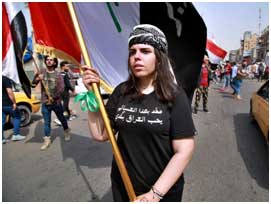
Women marched with national flag demanding women’s rights in Tahrir Square in Baghdad Sunday. Many of the participants wore T-shirts with Arabic that reads, “No one in this world loves Iraq as much as I do.”
In the massive rally for gender equality in Baghdad, a number of participants were spotted with coronavirus protection measures.
Venezuela
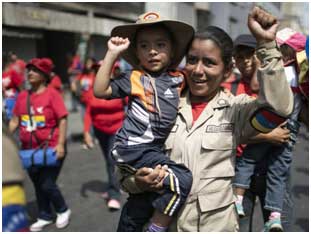
Women in Caracas and other cities in Venezuela joined rallied Sunday. A woman member of the National Bolivarian Militia carried her daughter during a march in Caracas.
Belarus

Five thousand women took part in a “Beauty Run” in Minsk, Belarus, Sunday, which is an official holiday in Belarus.
Madrid

Thousands of demonstrators raise slogans as they hold placards during a protest in Madrid, the Spanish capital. Rightists opposed the women’s rally.
Santiago

The women’s march in Santiago was massive. An aerial view of the women’s march in Santiago.
Al-Qahtaniyah, Syria
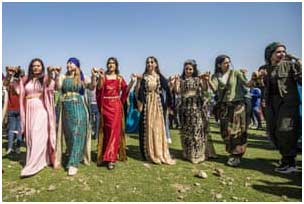
Women celebrated the day in the Kurdish-run province of Hasakeh.
Moscow
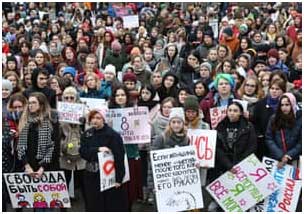
Thousands of women joined a solidarity and women’s rights rally organized by the activist group We Are Khachaturyan Sisters in Moscow.
Brasilia, Brazil
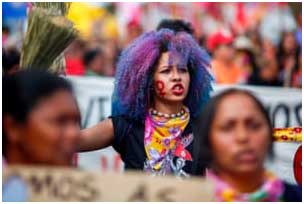
The Landless Workers Movement called for gender equality. Thousands of women joined in rallies across the country.
Paris

Hundreds of female members of the General Confederation of Labor (CGT) marched demanding equality in Paris.
Many protesters were seen dressed like WWII feminist icon, Rosie the Riveter, while others chose to wear next to nothing with placards reading ‘Stop the patriarchy pandemic!’
FEMEN’s performance on the Place de la Concorde combined feminist action with the coronavirus scare, as participants donned hazmat gear – on the lower parts of their bodies, at least – and “cleaned” the streets of “patriarchal virus.”
Yogyakarta, Indonesia

A rally was held under the 2020 theme “each for equality”.
Savar, Bangladesh
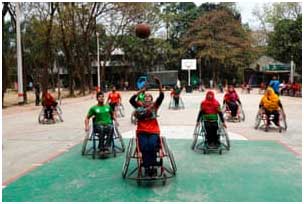
Female and male paraplegic basketball players play a friendly match jointly organized by the International Committee of the Red Cross and local NGO in Savar, Bangladesh.
Kabul
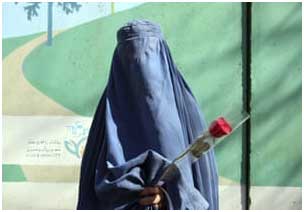
A woman holds a rose at a rally to mark the day. The big rally was joined by hundreds of women.
London

Women joined the March4Women demonstration. Many groups held online campaigns instead of street marches, using hashtags such as #FemaleStrike, #PowerUp and #38InternationalWomensDay.
A topless protest was held in London, this time combining climate change scare with feminism. The bare-breasted activists from the Extinction Rebellion group blocked Waterloo Bridge, while the inscriptions on their bodies read “Climate Murder”, “Climate Rape”, “Climate Abuse” and so on.
Lima, Peru
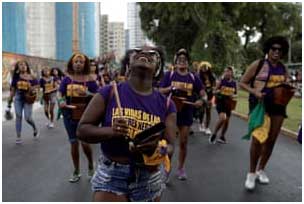
Thousands of women took part in a march in Lima.
Lausanne, Switzerland
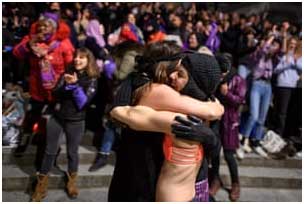
Women hug after a flashmob celebration in Lausanne, which was joined by hundreds of women.
Sydney
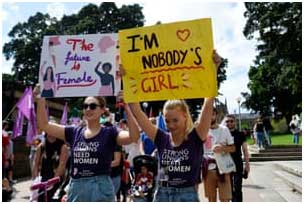
Hundreds of women took part in a march in Sydney.
Pakistan
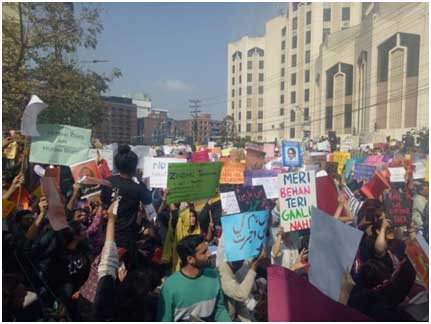
Women, together with the transgender community, non-binary folks and men, rallied across the country on Sunday participating in an event known as Aurat March to mark the day as they joined the global call for gender equality.
Organized by a diverse group of individuals across class, sexuality and ability, Aurat March gatherings and rallies were held in Karachi, Lahore, Islamabad, Quetta, Multan, Sukkur, Hyderabad and other cities to highlight the plight of women and other gender minorities.
The participants delivered hard-hitting speeches and held placards and banners displaying thought-provoking slogans to raise the pressing issues of gender-based violence including sexual harassment and assault in the workplace, deep-rooted misogyny and the patriarchal mindset prevalent in the society.
The country saw its first Aurat March in 2018 in Karachi. Last year it was extended to Lahore, Multan and Hyderabad among other cities. This time, women took to the streets in large number in Quetta and Sukkur.
In Karachi, hundreds flooded the Frere Hall garden for the march despite the beating sun.
Celebrated dancer and founder of the Tehreek-e-Niswan Sheema Kirmani, actor Samina Ahmed, PPP-Shaheed Bhutto leader Ghinwa Bhutto and Sindh government spokesperson Barrister Murtaza Wahab were among the prominent figures who participated in the event. Wahab had arrived there with his family.
At the entrance, Sindh police commandos, helped by dozens of volunteers, refused entry to men unaccompanied by women, in order to prevent any untoward incidents. Meanwhile, as a precaution against coronavirus, safety masks were handed out to all entrants, arranged by the South deputy commissioner.
Participants carrying placards and banners shouted slogans focusing on the rights of various communities, and particularly pointing out the importance of choice and freedom.
Qurat Mirza, one of the organizers, pointed out that the march was meant to challenge the patriarchy and its associated mindset. “All humans are equal. We are all equal to men,” she asserted. “The country can’t progress until and unless the state allows more than half the population into the system.”
The protesters called for gender equality and an end to the practice of “honour killings” of women, still practiced in some areas by hardline Muslims.
The marchers in Lahore gathered outside press club. A massive crowd of around 3,000 people from different walks of rallied through Egerton Road to Aiwan-e-Iqbal.
The participants delivered fiery speeches against cruelty on women, delay in dispensation of justice to them, a discriminatory system faced by them and for their freedom of expression along with several other issues.
Nighat Dad, one of the organizers of Aurat March, said the slogans raised by the participants were not controversial and should be taken in a broader sense.
Plays were also performed with the message that the women be given respect and basic rights and no one could restrain them from raising voice against cruelty they had been facing. Songs and music were also a part of the event with the recurrent theme that women should not be considered a weak segment of the society.
Human Rights Minister Shireen Mazari also took to Twitter to condemn the incident.
“Strongly condemn the stoning and violence against peaceful gathering of women, men and families in #AuratMarch2020. Our religion teaches tolerance and Sabr. It does not allow throwing stones and sticks at unarmed people one disagrees with. Can disagree with them but violence is unacceptable,” she wrote.
The Women’s Alliance organized Aurat March in Quetta outside the press club.
The marchers demanded equal rights for the women and vowed to continue fight against harassment and acid attacks.
In Multan, the marchers gathered outside the press club carrying placards and banners and chanting slogans demanding gender equality.
The participants of Aurat March in Sukkur gathered at Lab-e-Mehran garden and marched until the press club, demanding equality for women, right to education and an end to honour killings and forced conversions.
Women from a hardline religious seminary in Islamabad formed military style rows in a counter protest against an International Women’s Day march. The seminary women accused the women’s day marchers of vulgarity. The counter-protesters advocated conservative values.
Dozens of the seminary women turned up at the counter-rally, clad in long black robes, headscarves and face veils, segregated from dozens of men who stood in a nearby park. They stood in military-style rows, their fearsome appearance only jarred by blue, green and pink bows pinned to their shoulders, to identify which bus they should return on, explained one 25-year-old, who only gave her first name, Rubina.
“We don’t want women to make choices for their bodies. The choice rests with God,” she said. Nodding toward the women’s day march, she described the women there as “naked.” “These people don’t even wear dupatas,” she exclaimed, referring to the shawl that Pakistani women traditionally drape across their chests to signify modesty.
“Pakistan is getting more and more divided over time,” said Ambreen Gilani, a 41-year-old development consultant, gesturing to the Islamists across the road. The opposition to the women’s march helped motivate another protester to turn up, Sukaina Kazmi, a chemical engineer. She gestured to her Muslim headscarf, “Our religion does not teach us any of the things they are standing up against, our religion actually does fight for women’s rights,” she said.
As the protesters regrouped and walked away from the dozens of men trying to assault them, one organizer, Anam Rathor, said the violence underscored why they were demonstrating. “This proves our point, and this movement is growing. And now we will have more people. The reason why they are throwing stones is because they are afraid of us and that makes us happy.”
Like other provinces, Khyber-Pakhtunkhuwa also witnessed a multitude of participants demanding equal rights for women.
Although the idea of women’s rights has ruffled the feathers of certain religio-political organizations, who have taken to the streets deeming the procession ‘against the spirit of Islam’ and calling for its termination, it has also garnered widespread support throughout the country.
The Red Mosque brigade, a coalition of Islamist militant forces in Pakistan, attacked an International Women’s Day rally in Islamabad, hurling rocks, chunks of mud and even their shoes. The demonstrators, who were at a rival rally held by hardline Islamist organizations, were particularly enraged by one slogan the women’s day rally adopted: “mera jism, mera marzi” – “my body, my choice.”
Riot police set up large cloth barricades to dive the rival rallies, which flanked either side of a main road. But the police were also there to protect the women’s day protesters, after the hardline men and women threatened violence.
As the protest was winding down, dozens of men tried to push through the barricade, including a man who held a little girl aloft on his shoulders. According to a video uploaded to Twitter by a BBC reporter, police used batons to push them back. Still, for the next few minutes, they hurled projectiles that scattered the women’s day protesters, as journalists huddled behind concrete road dividers.
The hardline groups, their surrogates and conservative talking heads, took to the airwaves preceding the rally to condemn Pakistani feminists, accusing them of encouraging anti-Islamic vulgarity by raising a slogan that hinted that a woman had the right to do as she pleased.
The tensions even boiled over on a live talk show, where a screenwriter swore at a prominent Pakistani liberal after she interrupted him by chanting the slogan. “Nobody would even spit on your body,” he shouted in a clip widely shared on social media.
Conservative lawyers petitioned the courts in Pakistan’s three cities to ban the women’s marches. One prominent Islamist opposition leader, known as Maulana Fazl-ur-Rehman, threatened protesters on February 29, warning them not to chant “my body, my choice.” “God willing, we will also come out into the streets, and we will destroy you,” he warned. A senior teacher at Jamiat Hafsa, a hardline women’s seminary in the Pakistani capital, told her students would halt the march by organizing a rival “modesty march.”
“This is a march to stop that march,” said the woman, who uses the name Bint Azwa (the women at the seminary often use first names or fake names to avoid being identified by security institutions that monitor their activities). “We are not going to let those women march the streets of our country, our neighborhood, with those vulgar chants.”
Most notably the prime minister, the president and chief of army staff, in their separate messages, showcased their solidarity with the movement and pledged to ensure the rights of women and provide them with equal opportunities in all fields.
PML-N President Shehbaz Sharif, in his message from London, said his party had always taken steps for the protection and promotion of women.
PPP Chairman Bilawal Bhutto Zardari said women in Pakistan had been on the forefront of every struggle, against every tyrant.
Foreign Minister Shah Mahmood Qureshi wished everyone a, “Happy Women’s Day today and everyday,” on his Twitter handle.
EachforEqual
This year’s campaign theme was #EachforEqual. A gender equal world can be healthier, wealthier and more harmonious.
UN
The UN said in a statement: “The emerging global consensus is that despite some progress, real change has been agonizingly slow for the majority of women and girls in the world. Today, not a single country can claim to have achieved gender equality.”
The statement said: “Multiple obstacles remain unchanged in law and in culture. Women and girls continue to be undervalued; they work more and earn less and have fewer choices; and experience multiple forms of violence at home and in public spaces. Furthermore, there is a significant threat of rollback of hard-won feminist gains.”
UN says the year 2020 represents an unmissable opportunity to mobilize global action to achieve gender equality and human rights of all women and girls.
SIGN UP FOR COUNTERCURRENTS DAILY NEWS LETTER











































